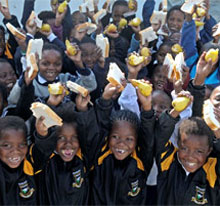
Children receive fruit as part of a fruit to schools program supported by the Global FoodBanking Network. Photo courtesy of Global FoodBanking Network
Recently, the Global FoodBanking Network (GFN) entered a service partnership with Rotary International to allow the two organizations to pool their resources to work closely together to fight hunger.
At GFN, we are excited to work with the many Rotarians who have already shown tremendous dedication toward making a difference in this area. Our two organizations share common goals.
Almost a billion people suffer from hunger and malnutrition worldwide. The UN’s Food and Agriculture Organization estimates that one in seven people go hungry every day, and most of them are women and children in the developing world. Needless to say, hunger is a complicated issue, giving rise to not just physical and mental illnesses but also social ones, such as low self-confidence and self-esteem and poor performance in school and work place.
And it’s not because there’s not enough food to go around. According to UN agencies, the world is producing enough food to feed over twice the present population. In fact, one-third of all food produced ends up in a landfill.
Food waste and hunger are two ends of the same problem. Food banking can be a part of the solution for both. Food banks source surplus food from many places – among them manufacturers, farms, grocery stores, restaurants and hotels. Food banks then make this food available through a network of local community agencies including school feeding programs, food pantries, soup kitchens, AIDS and TB hospices, elderly care facilities, orphanages, and other NGOs who provide food to the hungry.
Food banking began in the United States in 1967, and has been adopted and refined by other nations. However, much of the world is still unfamiliar with the concept. Global FoodBanking Network (GFN) is working to bring it closer to them.
Since its inception in 2006, we have developed or strengthened food banks in many countries including Bulgaria, Guatemala, Hong Kong, Colombia, Mexico and South Africa. Currently, we are working to develop food banks in Costa Rica, El Salvador, Honduras, Namibia and Nicaragua. Every year, we host a Food Bank Leadership Institute, a weeklong conference that brings together food bankers of varying levels of experience from around the world, to share ideas and thoughts. This sharing helps the organization expand the existing capacity of food banks and develop new food banks in countries where they do not exist.
But technical expertise is not enough. A steady group of dedicated, hardworking and generous volunteers is vitally important to the success of a food bank. With a history and legacy of commitment toward ending global hunger, Rotarians can play a huge role in helping food banks succeed around the world. Food banks need volunteers to organize food collection drives; sponsor trucks for delivery and distribution of food; and donate food, grocery products, equipment and services. Learn more ways you can help.
We are looking forward to a wonderful partnership!
Maurice Weaver is senior project manager for Global FoodBanking Network. You can follow GFN on Twitter @foodbanking and on Facebook.
How has your club worked with FoodBank or helped to alleviate hunger?

There is the need to assist children in Agbiyi Umuede Nkpa, Abia state
,Nigeria to reduce hunger and starvation presently.
LikeLike
Our Rotary Club of Kern River Valley collects non-perishable food at each meeting in support of a food bank for local community college students. And, we organized a GLEANING PROJECT to harvest potatoes left by commercial harvesters on local fields. Photos: https://www.facebook.com/media/set/?set=oa.10150919786940174&type=1
LikeLike